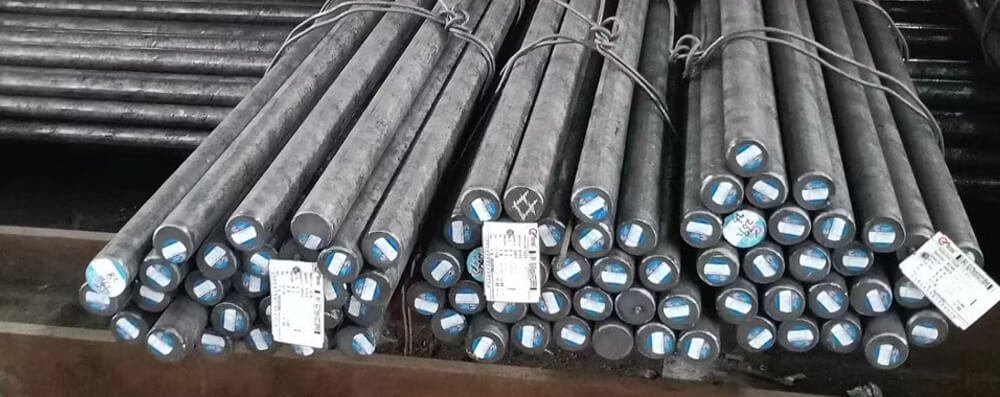Introduction
C20 carbon steel (equivalent to AISI 1020) is a low-carbon, mild steel grade known for its excellent machinability, good weldability, and moderate strength. It is typically supplied in either hot-rolled or cold-drawn condition and is widely used for manufacturing engineering components requiring moderate strength and high machinability.
Properties of C20 Grade:
- Excellent machinability and weldability
- Good ductility and impact resistance
- Moderate tensile and yield strength
- Can be carburized for surface hardness
- Cost-effective material for general engineering purposes
Uses/Applications of C20 Grade:
- Gears and shafts
- Machine components
- Bolts and studs
- Agricultural equipment
- Automotive components
- Pins and axles
- Hydraulic parts
- Cold headed fasteners
- Lightly stressed engineering parts
Chemical Composition (Typical):
| Element | Content (%) |
| Carbon (C) | 0.17 – 0.23 |
| Manganese (Mn) | 0.30 – 0.60 |
| Phosphorus (P) | ≤ 0.04 |
| Sulfur (S) | ≤ 0.05 |
| Iron (Fe) | Balance |
Mechanical Properties (Typical):
| Property | Value |
| Tensile Strength | 415 – 520 MPa |
| Yield Strength | 245 – 305 MPa |
| Elongation (in 50 mm) | 25% – 30% |
| Brinell Hardness (HB) | 119 – 179 HB |
| Reduction of Area | 35% (min) |
Physical Properties:
| Property | Value |
| Density | 7.87 g/cm³ |
| Melting Point | ~ 1480 – 1520 °C |
| Modulus of Elasticity | 200 GPa |
| Thermal Conductivity | ~ 51 W/m·K |
| Electrical Conductivity | ~ 10% IACS |
Forging:
C20 carbon steel can be forged at a temperature range of 1150 °C to 1260 °C, with finishing around 870 °C.
After forging, slow cooling is recommended to prevent the development of stresses and cracking.
Heat Treatment:
- Annealing: Annealing is carried out at 870 °C – 910 °C, followed by slow cooling to improve ductility and machinability.
- Normalizing: Normalizing at about 890 °C – 950 °C, followed by air cooling, refines the grain structure and improves mechanical properties.
- Carburizing: Common for improving surface hardness while maintaining a tough core.
- Stress Relieving: Conducted at around 540 °C – 650 °C after machining or welding.
Dimensional Tolerances:
Tolerances follow standard specifications such as ASTM A108 (for cold finished bars) or ISO 286 (for general tolerances):
- Cold Drawn Bars: Tolerances typically range from ±0.001″ to ±0.003″
- Hot Rolled Bars: Wider tolerances according to size and rolling process.
Special tight tolerances are available for precision applications.
Machinability:
C20 carbon steel offers excellent machinability in the annealed or normalized condition, rated around 70% – 75% relative to free-cutting steel (AISI 1112). It produces a smooth surface finish and responds well to conventional machining techniques like turning, milling, and drilling.
Corrosion Resistance:
C20 carbon steel is not inherently corrosion-resistant. It is prone to rusting in humid or corrosive environments. Protective coatings such as painting, oiling, galvanizing, or plating are recommended to enhance its service life, especially for outdoor use.
Weldability:
C20 carbon steel possesses excellent weldability and can be welded using common methods such as:
- Shielded Metal Arc Welding (SMAW)
- Gas Tungsten Arc Welding (GTAW/TIG)
- Gas Metal Arc Welding (GMAW/MIG)
- Submerged Arc Welding (SAW)
Preheating may be necessary for thick sections to avoid welding-induced cracking. Post-weld stress relieving is advised for critical components.
Available Form:
- Hot Rolled Round Bars
- Cold Drawn Round Bars
- Square Bars
- Hexagonal Bars
- Flat Bars
- Wire Rods
- Coils
- Custom Cut Lengths
Available in both bright drawn and black hot-rolled finishes.
Conclusion:
C20 carbon steel bar offers a practical balance between strength, ductility, and machinability. Its excellent weldability and surface treatment potential make it highly adaptable across a wide range of industries, particularly where moderate strength and good machining characteristics are required. Although it requires protection against corrosion, its versatility and economy ensure its continued popularity for general and automotive engineering applications.
Related Products :20C8, ASTM A36, 20MN2, 55C8, 40C8, C45, ASTM SA-105, C50, C20, C55, EN3B, C55 Mn2, C60, C45, EN9, EN8, EN8D, IS 2062, EN43B, S355J2G3, S40C, SAE 1010, SAE 1018, ST52.3, 20MN2, Maps


